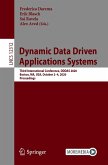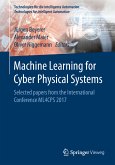Today, about 98 percent of microprocessors are already embedded in everyday objects and devices, connected with the outside world through sensors and actuators. They are increasingly networked with one another and on the internet. The physical world and the virtual world - or cyberspace - are merging; cyber-physical systems are developing.Future cyber-physical systems will contribute to security, efficiency, comfort and the health systems as never before, and as a result, they will contribute to solving key challenges of our society, such as the aging population, limited resources, mobility, or energy transition. Germany is in the position to become a leader in international competition thanks to innovative cyber-physical systems. In this statement, acatech explains what prerequisites must be created and how Germany can overcome the technical, political and social hurdles on the way to achieving this position.
Dieser Download kann aus rechtlichen Gründen nur mit Rechnungsadresse in A, B, BG, CY, CZ, D, DK, EW, E, FIN, F, GR, HR, H, IRL, I, LT, L, LR, M, NL, PL, P, R, S, SLO, SK ausgeliefert werden.









